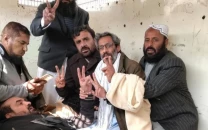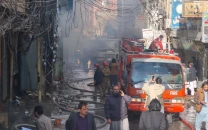KLF: The missing Baloch are among us
Mohammed Hanif launches his new book The Baloch Who is Not Missing and Others who are.

Writer Mohammed Hanif during his session on day two of the Karachi Literature Festival 2013. PHOTO: EXPRESS
The tiny Society Suite reserved for Mohammed Hanif’s mighty subject and audience was packed to capacity. Fifteen minutes prior to the writer’s arrival, the early birds had grabbed all the seats and late comers were left to worm their way through the narrow entrance door.
“These are not reserved seats, sir… not your personal property,” one irked attendee said sharply to a gentleman who was holding onto three vacant chairs. “Sorry, but these seats are for my wives,” he responded cheekily, while those around him burst into giggles. As they haggled with dignified restraint, a Karachi Literature Festival usher interrupted with the announcement: “Mohammed Hanif’s session has now been shifted to the Main Garden - everyone, please make your way there.”
Under a white awning in the pleasantly bright and expansive garden of Beach Luxury, hundreds of attendees made themselves comfortable as they waited for a session titled ‘Book Launch: The Baloch Who is Not Missing and Others who are, by Mohammed Hanif’ to open on day two of the fourth KLF. Apart from journalists and students, there was an interesting mix of people in attendance - ladies in saris, ladies in skinnies. The gentlemen were spotted in the more unexciting combination of pants and button-down shirts - except for the US Consul General’s security guys who wore khaki suits with matching shirts and ear-pieces.

The most striking individual in the vicinity, however, was Farzana Majeed, who walked on stage along with Hanif, moderator Mohammad Ali Talpur and HRCP director IA Rehman. Dressed in traditional Baloch kameez shalwar with long pockets at the front, even from a distance, Majeed’s veiled face stood out, her piercing gaze and confident steps arresting the audience’s attention. The moderator opened the session, talking about an issue that continues to haunt many Baloch people like her.
“The issue of missing people has been completely ignored by the press in general and society at large,” said Talpur. As he related chilling accounts of numerous young men who have been snapped and ingested by the flytrap of the security agencies, he paused and said, “The pain of the relatives of missing people is unimaginable.”
Hanif didn’t quite agree, and also chose to switch to speaking in Urdu. “In one way, their pain is conceivable. Imagine what you would go through if your child were 30 minutes late coming home from school or tuitions,” said the writer, causing some women to gasp and others to squirm in their seats. “If your child is late and he and his teachers do not answer their phones for two hours, what state will you be in?”
In brazen words, Hanif said Pakistan’s media, courts and society are willfully numb when it comes to the reality of missing people in Balochistan. “Why is it that in the bustling city of Karachi, relatives of missing persons who have been camping outside the press club for months go unnoticed - we act like they are missing,” he joked wryly.
Majeed spoke next. “My brother Zakir Majeed has been in the custody of intelligence agencies for four years,” she began, as all eyes locked onto her. He used to talk about human rights, she said, and for that he was silenced. According to her, there are more than 15,000 cases of missing people in Balochistan, with about 700 bullet-riddled bodies recovered.
“They do it because they can,” said Hanif, referring to the security and intelligence agencies allegedly responsible for these illegal abductions. “These are all middle class, college-going boys they have been kidnapped - could the fauj get away with this in a place like Lahore? No, because they know they will be questioned.”
After Hanif read out an excerpt from his pamphlet, Talpur remarked that the ISPR may issue a statement against the publication, saying it is fabricated. Hanif responded by making a joke: “I don’t know why but for some reason these people from the ISI and military are all either Zafars or Sajjads.”
When the Q&A session opened, a gentleman who asked the panelists why Imran Khan ignores the Balochistan issue was met with eye rolls. Talpur responded by saying, “You should be asking him this question!”
Another gentleman identified by the name Rasheed Khosa said that he was abducted by the security agencies for two weeks in Balochistan. “I went through it all myself,” he said. “I implore to the Chief Justice of Pakistan, if you want to know who they are, what they do and who else is languishing in those cells, I can identify them.”
Published in The Express Tribune, February 17th, 2013.



















COMMENTS
Comments are moderated and generally will be posted if they are on-topic and not abusive.
For more information, please see our Comments FAQ